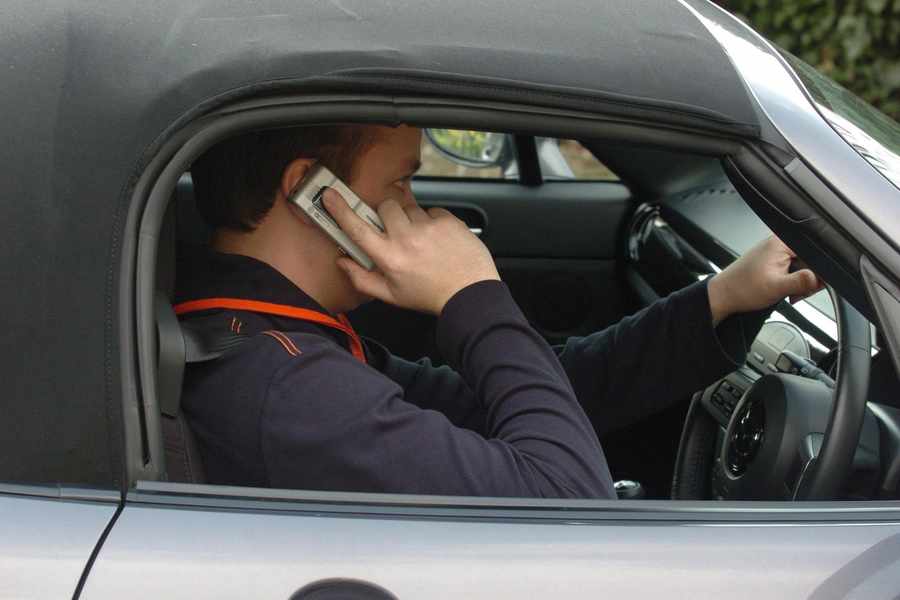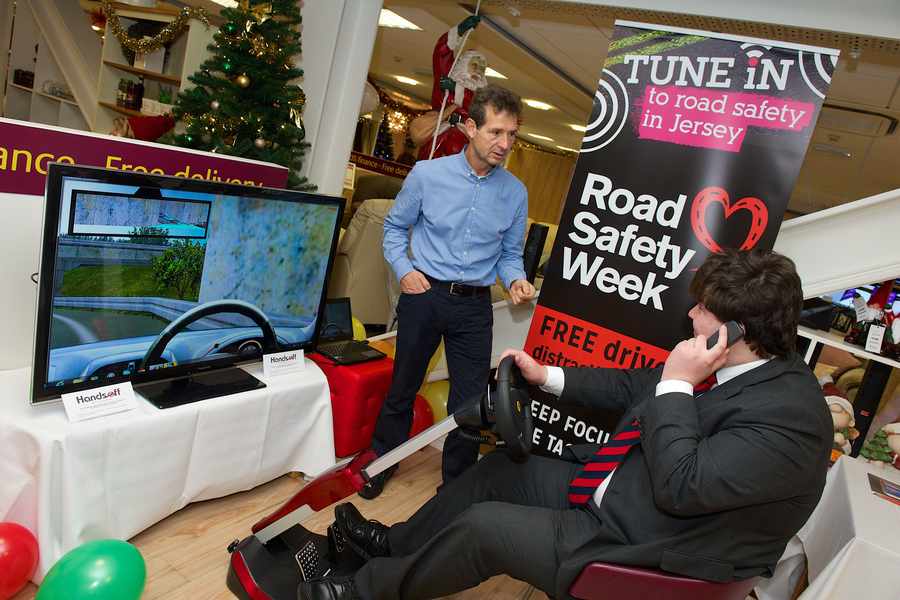- Crackdown on drivers using mobiles
- Persistent offenders could lose licences
- UK-style points system could be introduced
A UK-style points system for driving offences, including for people using mobile phones behind the wheel, could be introduced in Jersey in an effort to improve road safety.
Transport Minister Eddie Noel has confirmed that his department are working on a new road safety strategy and that he could ‘see the merits’ of a points system similar to the one used in the UK.
- The courts can fine you and endorse your driving licence with penalty points if youre convicted of a motoring offence.
- Endorsements will stay on your driving licence for four or 11 years, depending on the offence.
- The endorsement (and penalty points) is put on your driver record and is also written on your driving licence.
- You can be disqualified from driving if you build up 12 or more penalty points within a period of three years.
- New drivers will have their licence revoked if they get 6 or more points within two years of passing their test.
- Each endorsement has a special code and is given penalty points on a scale from 1 to 11. You get more points for more serious offences.
There, those convicted of driving offences can receive penalty points on their licences. Drivers who build up 12 points within three years can be disqualified from driving.
The minister refused to rule out introducing a similar approach in Jersey.
He also said that allowing the States police to issue on-the-spot fines for drivers – again as they do in the UK – was another issue that he intended to raise.
It comes after the JEP revealed that hundreds of Islanders caught using their phones while driving are escaping with little or no punishment, with just three per cent of the 372 motorists pulled over for the offence last year taken to court.
Meanwhile, Home Affairs Minister Kristina Moore has said that motorists who persistently use their phones while driving should be banned.
She said that the level of fines currently issued in such cases – up to £75 for first offenders dealt with at parish hall level – was ‘under review’.
Deputy Noel said that he would be working with the Home Affairs Department and the honorary police to improve road safety legislation.
‘On-the-spot fines and a points system is something we should be looking at,’ he said. ‘A points system is certainly something I want to put on the agenda.
‘I can see the merits in it and it is something I would consider backing.’
‘Perhaps there could be a policy whereby the second offence is taken to court.’
Jersey banned drivers from using their mobile phones while driving in 1998. Currently motorists caught using their phone are often dealt with at a parish hall inquiry – where first-time offenders can receive a discretionary fine of up to £75 but often escape with just words of advice.
A points-based system would mean that persistent offenders could face driving bans if they accumulate numerous offences on their licence.
In the UK, for example, drivers caught using their mobile phones while driving are automatically issued with a fixed-penalty notice and receive three points on their licence and a fine of £100.
Deputy Moore, meanwhile, has called for drivers persistently using their mobile phones to face driving bans.
She said: ‘It is definitely something that the police take very seriously and road safety is a high priority.
‘If someone reports a driver using their mobile phone and notes the number plate, then the police can’t necessarily prosecute but they would visit the driver and give them a word of caution. That would be recorded and if that person is subsequently caught, then they would be punished with the previous offence in mind.’
She added: ‘Personally, if someone consistently flouts the law then yes, I believe they should be banned. It should be clear that using a phone is not acceptable.’

The following road crimes currently receive the following numbers of points in the UK:
- Failing to stop after an accident – 5 to 10
- Driving while disqualified – 6
- Driving whilst using a mobile phone – 3
- Driving without due care and attention – 3 to 9
- Causing death through careless driving when unfit through drink or drugs, or inconsiderate driving – 3 to 11
- Using a vehicle with defective brakes, tyres or steering – 3
- Dangerous driving – 3 to 11
- Driving or attempting to drive with alcohol level or drum level above limit – 3 to 11
- Using a vehicle uninsured against third party risks – 6 to 8
- Exceeding statutory speed limit on a public road – 3 to 6
- Failing to comply with traffic light signals or stop sign – 3
THE initiative by Transport Minister Eddie Noel to impose a points system on Island drivers is to be welcomed.
In recent years it has been apparent that the rules of the road are repeatedly being flouted – including the use of mobile phones while vehicles are in motion.
Unfortunately, it is often difficult to police such misdemeanours unless an officer of the law is a witness to the act.
Even then, imposing penalties can take some considerable time to get through the legal system and, on an ongoing basis, is unlikely to target repeat offenders. Points on a licence, however, cannot be ignored.
At the same time, there is no excuse, given modern technology and ‘hands-free’ equipment, for any driver to need to clamp their mobile to their ear while on the road.
However, as with any legislation, the way in which it is administered will need to be proportionate, measured and fair, rather than draconian.


JEP reporter Michael Morris tested a driving simulator to see how difficult it was to drive while using a mobile phone:
THE idea of the driving simulator is to show how difficult it is to drive while distracted while using a phone.
Well, judging by my first attempt, the phone wasn’t the problem, as within seconds I’d somehow managed to plough the car into a lamp post before I’d even reached for my phone as I struggled to get to grips with the technology.
The simulator resembles a video game, complete with driver’s seat and steering wheel (imagine Grand Theft Auto, but with strict adherence to the Highway Code), and it took a few attempts before I managed to come to terms with the machine.
Once I became more comfortable with driving on the virtual roads, I was encouraged to hold my phone to my ear, while Paul, who was stood by my side, had a conversation as if he was on the phone.
I managed to keep control for about a minute, before sailing through a red light, which immediately brought up a ‘serious warning’, that ended the simulation.
The simulator was good fun, although didn’t feel particularly like driving a real car, it did, however, succeed in getting its message across.






